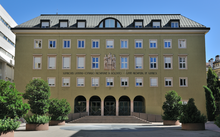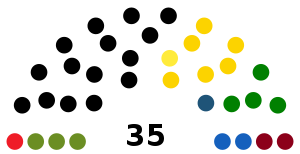Politics of South Tyrol
 |
|---|
|
|
The politics of South Tyrol is conducted through a parliamentary, democratic autonomous province with a multi-party system. Executive power is exercised collectively by the Landesregierung, which is led by the Governor, referred to as "Landeshauptmann" in German. Legislative power is vested in the Landtag primarily, and secondarily on the provincial government. The judiciary is independent of the executive and the legislative branches. South Tyrol has been an autonomous province within the Italian Republic since 1948, when the Gruber – De Gasperi Agreement was agreed upon between Austria and Italy.
The current Landeshauptmann is Arno Kompatscher.
Provincial government[]

The local government system is based upon the provisions of the Italian Constitution and the Autonomy Statute of the Region Trentino-Alto Adige/Südtirol.[1] The 1972 second Statute of Autonomy for Trentino-Alto Adige/Südtirol devolved most legislative and executive competences from the regional level to the provincial level, creating de facto two separate regions.
The executive powers are attributed to the provincial government (German: Landesregierung; Italian: Giunta Provinciale) headed by the Landeshauptmann Arno Kompatscher, who has been in power since 2014. He belongs to the South Tyrolean People's Party.
List of governors[]
| Governors of South Tyrol | |||||
|---|---|---|---|---|---|
| Governor | Portrait | Party | Term | Legislature | |
| Karl Erckert | 
|
SVP | 1948–1952 | I Legislature | |
| 1952–1955 | II Legislature | ||||
| Alois Pupp | 
|
SVP | 1955–1956 | ||
| 1956–1960 | III Legislature | ||||
| Silvius Magnago | 
|
SVP | 1960–1964 | IV Legislature | |
| 1964–1968 | V Legislature | ||||
| 1968–1973 | VI Legislature | ||||
| 1973–1978 | VII Legislature | ||||
| 1978–1983 | VIII Legislature | ||||
| 1983–1988 | IX Legislature | ||||
| 1988–1989 | X Legislature | ||||
| Luis Durnwalder | 
|
SVP | 1989–1993 | ||
| 1993–1998 | XI Legislature | ||||
| 1998–2003 | XII Legislature | ||||
| 2003–2008 | XIII Legislature | ||||
| 2008–2013 | XIV Legislature | ||||
| 2013–2014 | XV Legislature | ||||
| Arno Kompatscher | 
|
SVP | 2014–2018 | ||
| 2018–present | XVI Legislature | ||||
Provincial council[]

The considerable legislative power of the province is vested in a provincial assembly called Landtag (German: Südtiroler Landtag; Italian: Consiglio della Provincia Autonoma di Bolzano; Ladin: Cunsëi dla Provinzia Autonoma de Bulsan). The legislative powers of the assembly cover all those subject matters that are not expressly reserved to the exclusive legislative power of the Italian State or to concurrent legislation per article 117 of the Italian Constitution.
Last provincial elections[]
 | ||||||
| Parties | Votes | % | Seats | +/− | ||
|---|---|---|---|---|---|---|
| South Tyrolean People's Party | 119,109 | 41.9 | 15 | −2 | ||
| Team Köllensperger | 43,315 | 15.2 | 6 | +6 | ||
| League | 31,515 | 11.1 | 4 | +4 | ||
| Greens | 19,392 | 6.8 | 3 | ±0 | ||
| Die Freiheitlichen | 17,620 | 6.2 | 2 | −4 | ||
| South Tyrolean Freedom | 16,927 | 6.0 | 2 | −1 | ||
| Democratic Party | 10,808 | 3.8 | 1 | −1 | ||
| Five Star Movement | 6,670 | 2.4 | 1 | ±0 | ||
| Alto Adige in the Heart – Brothers of Italy | 4,882 | 1.7 | 1 | ±0 | ||
| Citizens' Union | 3,665 | 1.3 | 0 | −1 | ||
| We South Tyrol | 3,428 | 1.2 | 0 | ±0 | ||
| Forza Alto Adige | 2,826 | 1.0 | 0 | ±0 | ||
| CasaPound | 2,451 | 0.9 | 0 | ±0 | ||
| United Left | 1,753 | 0.6 | 0 | ±0 | ||
| Total | 284,361 | 100.0 | 35 | ±0 | ||
| Source: Province of Bolzano – Results | ||||||
Political parties and elections[]


The independence controversy is especially an issue of the German parties Die Freiheitlichen, South Tyrolean Freedom and Union for South Tyrol. With the 2008 Kosovo declaration of independence, the idea of a Freistaat (free state) resurfaced again.[2][3] Eva Klotz and her party South Tyrolean Freedom, which launched the campaign South Tyrol is not Italy!, are among the strongest advocates of self-determination.
During the 2008 regional elections, the incumbent South Tyrolean People's Party lost votes to her party, the regionalist Lega Nord Alto Adige – Südtirol and Die Freiheitlichen, who have close ties to the nationalist Freedom Party of Austria.[4]
Autonomy issues[]
The Südtiroler Heimatbund asked the Soffi-Institute in Innsbruck to conduct an opinion poll on the future of South Tyrol. The poll was conducted at the end of 2005 in which only German-speaking South Tyroleans were asked. 45.33% of those asked were in favour of remaining with Italy, 54.67% were against remaining. The latter group comprised 33.40% in favour of an independent state and 21.27% in favour of Tyrolean reunification with Austria.[5]
Another poll conducted in August 2008 by the apollis Institute of Social Research and Opinion Polling in Bolzano asked 502 Italian-speaking South Tyroleans of their opinion. The poll consisted of three parts. To the first question if a referendum about remaining with Italy should be held at all, 41% said yes and 59% no. In the event of a referendum, 78% wished to remain with Italy, 20% were in favour of an independent state and 2% in favour of Tyrolean reunification with Austria.[6]
A poll conducted in 2013 among German and Ladin speakers by the Austrian Kasmarin agency showed the following results: To the question "If a referendum were conducted also in South Tyrol and you had a choice, how would you decide?", 26% would opt for staying within Italy, and 54% for independence from Italy.[7]
Across the border in the Austrian state of Tyrol, the Tiroler Tageszeitung conducted a poll in January 2009 to gauge the opinion of the inhabitants of North and East Tyrol. 500 people were asked in the poll. In 2008, 45% wished a reunification with South Tyrol, that number increased in 2009 by 4% to 49% in favour. 36.6% were against reunification while 14.1% had no opinion. In the age group of 15- to 29-year-olds, 71% were in favour of reunification. The highest support by district was in the Oberland with 67% while Innsbruck city and district was lowest with 42%.[8]
Further reading[]
- Marc Röggla. 2019. "Consensus Impossible? South Tyrol’s Autonomy Convention and the issue of Self-determination." Journal of Autonomy and Security Studies
References[]
- ^ "Special Statute for Trentino-Alto Adige" (PDF). Archived from the original (PDF) on 2007-09-26. Retrieved 2007-11-14.
- ^ "Die Vision Freistaat". Panel discussion held by Dr. Günther Pallaver (Political Scientist, Professor at the Faculty of Political Science of the University of Innsbruck), with Dr. Riccardo Dello Sbarba (Landtagsabgeordneter der Grünen Fraktion), Dr. Eva Klotz (Landtagsabgeordnete der Südtiroler Freiheit), Pius Leitner (Landtagsabgeordneter der Freitheitlichen), Dr. Martha Stocker (Landtagsabgeordnete der Südtiroler Volkspartei). Cusanus Akademie in Brixen. February 2, 2009. Retrieved 2009-02-22.
- ^ "Selbstbestimmungsrenaissance?". Intervista a Professor Günther Pallaver. Brennerbasisdemokratie. February 2, 2009. Retrieved 2009-02-22.
- ^ "Landtagswahlen 2008" (PDF). Listenstimmen auf Sektionsebene. Presseamt der Autonomen Provinz Bozen — Südtirol. October 26, 2008. Retrieved 2009-02-21.
- ^ Südtiroler Heimatbund (2006). "Wissenschaftliche Meinungsumfrage des Heimatbundes und Cossiga-Vorschlag". SOFFI-Institut. Retrieved 2009-02-22.
- ^ Südtiroler Heimatbund (2008). "Meinungsumfrage zur Selbstbestimmung: Nur 55% der Italiener würden definitiv für Italien wählen". apollis Institute of Social Research and Opinion Polling. Retrieved 2009-02-22.
- ^ "Die Sezessions-Umfrage". Tageszeitung Online. 2 July 2013. Archived from the original on 7 April 2014. Retrieved 5 April 2014.
- ^ "Gesamttirol gewinnt Anhänger". Tiroler Tageszeitung. January 4, 2009. Archived from the original on July 26, 2009. Retrieved 2009-02-22.
- Politics of South Tyrol